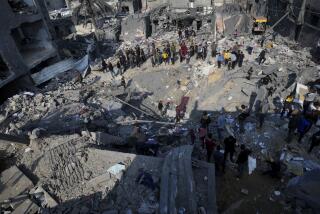U.S. Working to Convince World Iraq Is Out of Line
- Share via
WASHINGTON — The Bush administration’s top foreign policy team huddled Tuesday over a three-pronged strategy it is prepared to launch once U.N. inspectors reveal their assessment Thursday of Iraq’s weapons declaration, administration officials said.
The strategy will focus on a strong campaign to convince the U.S. public and the world that Iraq has not yet come clean on having a deadly arsenal, quiet diplomacy to build unity on action at the U.N. Security Council and behind-the-scenes planning for a toughened round of inspections to prove the U.S. argument, the sources said.
With its own tentative conclusion on the voluminous weapons declaration in hand, “we start getting together our list of most likely cases and candidates to catch Iraq in flagrante delicto,” said a well-placed U.S. official who requested anonymity.
The United States does not want to be seen as trying to preempt Thursday’s report by chief U.N. weapons inspector Hans Blix, so it will not air a fuller assessment until later in the week or over the weekend, U.S. officials say. Washington also does not want to be seen as taking the lead or dictating to the United Nations at this critical juncture.
“We’re not going to get too detailed on Thursday. We’re not going to be talking so much about mustard gas and [nerve agent] VX as the fact that there were omissions in the declaration. It wasn’t detailed enough. It didn’t give any proof as to what was destroyed,” a U.S. official said.
And when the United States does offer its assessment, it won’t be the final word from the administration.
“Don’t bill this as a definitive or instant grand jury indictment on Thursday. We will base our final conclusions down the road on the Blix assessment as well as on further analysis, discussions with supplier countries [that sold Iraq items used for weapons systems], other permanent members of the Security Council and other things,” a senior State Department official said.
Britain also indicated Tuesday that Prime Minister Tony Blair wouldn’t give a full reaction until after Christmas, a government spokesman said. Foreign Minister Jack Straw, however, has already made it clear that London takes a skeptical view of Baghdad’s declaration.
Whereas the U.S. and Britain are in general agreement that Iraq’s 11,807-page declaration is deeply flawed, Washington expects different reactions from the other three permanent Security Council members -- France, Russia and China -- according to U.S. officials and U.N. envoys.
All five, however, will agree that this is not the moment to go to war, the sources predicted.
“Expect to see varying degrees of reaction -- some will say partial breach, others will say complete,” said an envoy from a Security Council country. “The only point of full agreement is that this is not the trigger for military action.”
Secretary of State Colin L. Powell -- who mapped strategy Tuesday with Vice President Dick Cheney, Defense Secretary Donald H. Rumsfeld, National Security Advisor Condoleezza Rice and CIA Director George J. Tenet -- is already in the thick of diplomatic coordination, U.S. officials say.
Powell talked Tuesday with Blix as well as his French and European Union counterparts and U.N. Secretary-General Kofi Annan, according to a State Department spokesman.
The United States is priming the rest of the council for the “strong views” it will air this week, U.N. diplomats say. They expect the administration to say that the declaration is full of false statements and omissions and that there’s no hope of redemption.
“It’s the first nail in the coffin,” said a Security Council diplomat who has been briefed on U.S. strategy. “The second nail should come in January.”
France and Russia negotiated hard to ensure that U.N. Resolution 1441 -- which set up a new round of weapons inspections in Iraq -- said that omissions alone in the declaration would not constitute a material breach that could trigger a U.S.-led attack on Iraq. Only Iraq’s failure to fully account for its arms, combined with a failure to comply with the resolution, could be considered a trigger for war.
In New York, French diplomats made it clear Tuesday that they intended to hold the United States to both the letter and the spirit of the resolution -- and that they were not yet convinced Iraq still has weapons of mass destruction.
The United States is closely coordinating its efforts with Blix and the United Nations. John Wolf, assistant secretary of State for nonproliferation, was in New York on Tuesday for the second time in a week to meet with Blix and U.N. weapons analysts.
Wolf and John D. Negroponte, the U.S. ambassador to the U.N., gave Blix a preliminary assessment of what Washington sees as serious omissions and discrepancies in the declaration along with recommendations for next steps by the inspectors.
U.S. officials said this week that as the inspections progress, they will begin to provide more specific intelligence, such as recommended “hot spots” for the inspectors to visit and the names of scientists and engineers involved in developing Iraq’s weapons system for interviewing.
*
Wright reported from Washington and Farley from the United Nations.
More to Read
Sign up for Essential California
The most important California stories and recommendations in your inbox every morning.
You may occasionally receive promotional content from the Los Angeles Times.










